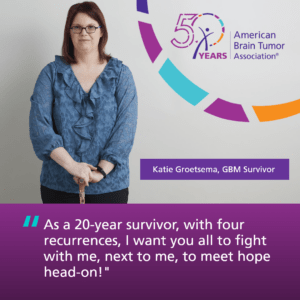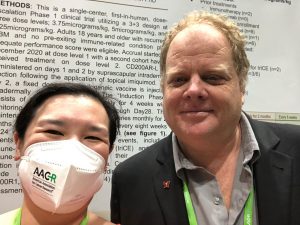by Britt McHenry
As I was wheeled into the operating room at Johns Hopkins on March 4, 2020 for an eight-hour craniotomy, for just a second I thought, “I don’t know if I’m going wake up from this.”
Gratefully, I DID wake up, after my amazing team successfully removed a grade 2 astrocytoma the size of two golf balls from my left frontal lobe.
The first thing I asked for? A cup of coffee.
I listened to “Escape (The Piña Colada Song)” by Rupert Holmes on repeat to cheer myself up. I was in the ICU after all, bright lights all around me, wearing what looked like a helmet of gauze on my head. I even joked that I should put the NFL logo on it.
When my medical team eventually took my “helmet” of gauze off, the swelling moved from my head to my face. With my career in broadcast news and sports, I was nervous to eventually go back on camera. “Would my face still look as bloated?” I wondered. “Am I going to be seen as damaged goods?”
The physical and emotional trauma after diagnosis and surgery — along with Covid-19 lockdown less than two weeks later — were the most challenging time of my life.






I felt like I lost a part of me, because physically, I did.
All told, I’m an extroverted, confident person. But for the first three weeks after surgery, I experienced intense mood changes. I’d get impatient and angry. Then, I’d have bouts of depression. The fear of fatality would hit me. I felt half-dead. I would only learn later that decreased motivation, mood swings and even drastic changes in personality are symptoms of frontal lobe trauma.
My expert neurosurgeon, Dr. Henry Brem, essentially said to me, “You’re going to feel this in a month. It will take you, and it’s OK to feel that. It’s not normal to have your head cut open.”
He was right. Acceptance was hard. My confidence only came back about six months ago.
What have I learned from all this?
Those little things we get bogged down by, they just don’t matter.
Early in my career, I was very competitive. At one point, I had two jobs, traveling between New York and Washington D.C. All I cared about was job and career advancement. When I started having next-level migraines, like most Americans, I told myself, “It’s just stress, I have to push through it.” But after trying self-care, massage and acupuncture for six to eight months, I decided to see a chiropractor. When I shared my symptoms, he immediately scheduled an MRI.
Soon after the MRI, the lead radiologist called me into his office. As I walked down the cold, sterile hallway, I began to cry. I knew something was wrong. When I walked in, I could see on an array of monitors, there was my tumor, clear as day. It was massive. When I heard the word, “brain lesion,” I thought I was going to die.
But I did not die from my brain tumor, and I am here to tell you now that YOU ARE NOT ALONE.
Whether you are a survivor like me, or a caregiver, or a friend or co-worker of a brain tumor survivor, during Brain Tumor Awareness Month, I encourage you to share your story. I want the general public to have a little more understanding. Having a brain tumor is a life-enduring medical issue.
The more we can share, the more we can heal.
Britt McHenry is a former ESPN Reporter and Fox News Contributor. Check out her podcast, Pump the Brakes, wherever you find your favorite podcasts.




















